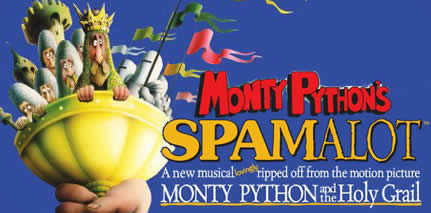
Before anything else, let me say that the show was very funny, and definitely worth attending. The preview last night was filled with thirty-and-forty-somethings, weaned on the film since adolescence, loudly itching for the curtain to rise. When the lights dimmed and a wacky amplified voice assured us that it would be OK to leave our cell phones on and let them ring, the audience burst into uncontrollable screams and cheers. Go to see this show if you love the film, and stop reading this post right now. However, if you want to know some of my current thought on the state of musical theater in America, take two Tylenols and read on.
Monty Python's Spamalot is the latest in a disturbing trend in musical theater that is occurring on both sides of the Atlantic. No doubt inspired by the mega-success of The Producers, and helped by current wintry economic conditions that impede taking any kind of risk, Broadway angels are investing millions in musicals based on established film hits and classics. For the first time in the history of the musical theater a rash of these pre-fabricated spectacles are sweeping through the West End and Broadway, and producers are counting on this "theater of the familiar" trend to keep them solvent for years to come; or in the case of Mel Brooks, financially secured for a lifetime.
The many billboards around Times Square are currently advertising Chitty Chitty Bang Bang and Dirty Rotten Scoundrels, two upcoming shows based on films ("Scoundrels" is already in previews, and "Bang Bang" begins previews in March). Other billboards advertising films turned into musicals include Wicked (based on a novel, which in turn is based on The Wizard of Oz), the revival of La Cage aux Folles (perhaps one of the first of these musicals) and Fiddler on the Roof. As far as "Fiddler" goes, one of Broadway's most beloved shows, and one of my personal favorites, I can't help but wonder if its current revival is due to the inherent popularity of the property as a show, or to the fact that producers found out that it was an Academy Award-winning Norman Jewison film back in the 1970's.
At the performance last night I experienced layers of disturbing behavior. Hank Azaria came out on stilts with a long coat and horns on his head and announced that "we are the knights who say..." before he was able to utter the fabled word "NI" already a dozen hushed voices in the crowd had said it. This kind of behavior went on the entire show. It seemed as if the audience was cueing the actor's next line, a sort of pre-echo: a behavior unheard of in a Broadway show before the advent of this type of entertainment. As these upcoming shows begin to fill the Broadway stages, this type of audience participation will become the norm. People are now paying money to be entertained by the sure-thing-musical that will not pose a financial threat. After all, at $100 a pop audiences want to know what they are paying for. No doubt the first audiences filling the theaters these days, as was last night, will be the die-hard fans. Producers are counting that, as word of mouth spreads, they won't be the last.
Possibly the most surprising event at last night's performance came during the re-enactment of the French taunter scene by the walls of the castle which ends a very short Act One. Hank Azaria decided to act. To put his own stamp on the character, as actors have done since time began, and not follow the cadences, mannerisms, and style found in John Cleese's brilliant performance forever preserved on celluloid. At the intermission, my friend Keith, who got the tickets, and I agreed that the French taunter scene was weak. Why? Not because Hank Azaria was weak, but because somehow he had not successfully given the illusion of duplicating Cleese's madcap performance.
After attending Monty Python's Spamalot I came to the conclusion that audiences at a pre-fabricated Broadway musical are the hardest to please, especially since the majority merely want to recapture the rapture found in the film. Everything must be in place, every line must be said correctly, every nuance must be there, and everything must be like the film they love. Why they would pay all the money to attend it live instead of plunking down a few dollars to rent or buy the DVD is the question. The answer lies, I believe, in the magic of live theater and audiences need to experience it. This, together with the curiosity of how their favorite movie will play live, is the lure of the new Broadway season.
No comments:
Post a Comment